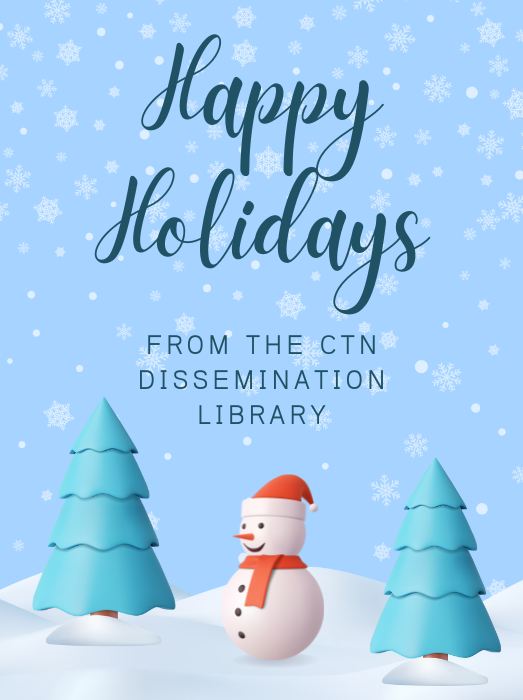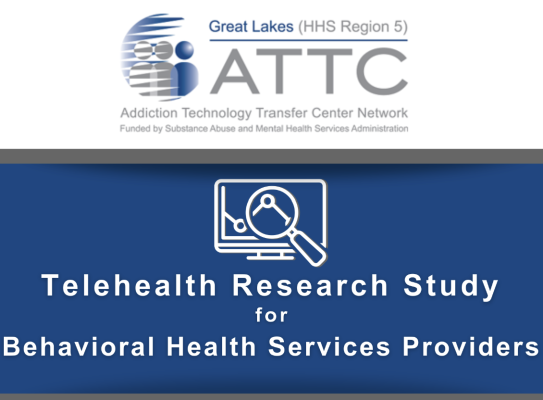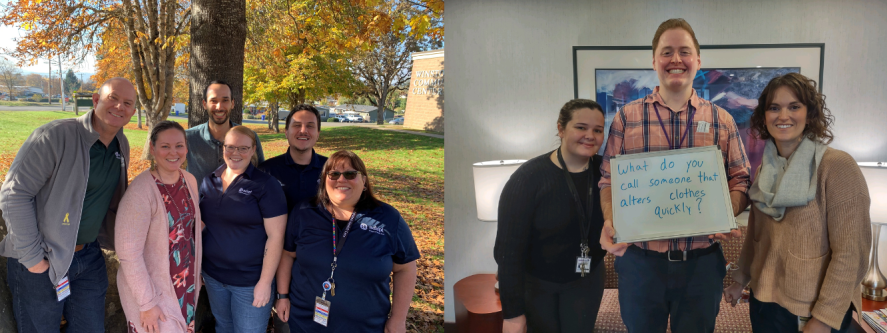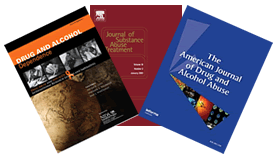See You in 2023, CTN Community! |
|
|

|
CTN Trial Progress
 Randomizations for Active Studies as of the December 15 Trial Progress Report. Randomizations for Active Studies as of the December 15 Trial Progress Report.
CTN-0080 - Enrolled 116
CTN-0097 - Enrolled 415
CTN-0098 - Enrolled 103
CTN-0099 - Enrolled 1292
CTN-0099-A-1 - Enrolled 92
CTN-0100
Discontinuation - Enrolled 103
Retention - Enrolled 610
CTN-0101 - Enrolled 190
CTN-0107 - Enrolled 98
CTN-0108 - Enrolled 64
|
· · · · · · · · · · · · · · · · · · · · · · · · · · · · · · · · · · · · · · · ·
· · · · · · · · · · · · · · · · · · · · · · ·
Behavioral Health Providers: Please Take This ATTC Telehealth Survey
 When COVID-19 erupted across the globe in March 2020, behavioral health providers transitioned from providing face-to-face care to virtual services practically overnight. The Great Lakes ATTC surveyed behavioral health services providers in the summer of 2020 to gather some initial feedback and data on the use of telehealth services at that time. When COVID-19 erupted across the globe in March 2020, behavioral health providers transitioned from providing face-to-face care to virtual services practically overnight. The Great Lakes ATTC surveyed behavioral health services providers in the summer of 2020 to gather some initial feedback and data on the use of telehealth services at that time.
The Great Lakes ATTC is now conducting a follow-up research study on the use of virtual behavioral health services and its benefits and challenges. You are being asked to complete this very brief survey because we want your perspectives on this issue as a behavioral health services provider.
By completing this 10-minute survey, you will help us gain a better understanding of:
- How behavioral health providers are using telehealth services and technology
- The benefits of offering telehealth services for behavioral healthcare
- The projected future use of telehealth services and technology
After completing the survey, you will have the option to submit your email address to receive a copy of the survey results from your state. The survey results will also be available on the Great Lakes ATTC website.
Take the Survey Here!
· · · · · · · · · · · · · · · · · · · · · · · · · · · · · · · · · · · · · · · ·
· · · · · · · · · · · · · · · · · · · · · · ·
Funding Opportunity Announcement: Research on Community Level Interventions for Firearm and Related Violence, Injury and Mortality Prevention (UG3/UH3 Clinical Trial Required)
 Violence affects people of all ages and its impact is far-reaching. It is a leading cause of death and nonfatal injuries in the United States and constitutes a major public health crisis, especially among young people, and in particular among racial/ethnic minority, sexual and gender minority (SGM) and disability populations. Violence affects people of all ages and its impact is far-reaching. It is a leading cause of death and nonfatal injuries in the United States and constitutes a major public health crisis, especially among young people, and in particular among racial/ethnic minority, sexual and gender minority (SGM) and disability populations.
NIH is committed to supporting research that identifies innovative prevention approaches to reduce firearm and related violence, injury and mortality. Within the legislative mandates and limitations of NIH funding (NOT-OD-21-058, NOT-OD-21-056), this initiative will support a network of research projects to develop and test interventions at the community or community organization level that aim to prevent firearm and related violence, injury and mortality.
This FOA solicits bi-phasic research projects proposed in UG3/UH3 Phased Innovation Awards Cooperative Agreement applications. Funding for the UG3 phase (phase I) will be used to demonstrate sufficient preparation, feasibility and capacity to meet foundational milestone targets specific to the work proposed. A UG3 project that meets its milestones will be administratively considered by NIH and prioritized for transition to the UH3 award (phase II). Applicants responding to this FOA must address specific aims and milestones for both the UG3 and UH3 phases.
Key Dates:
- Open date (earliest submission date): February 3, 2023
- Application due date: March 17, 2023.
- Letter of intent due: 30 days before application due date
- Earliest start date: September 2023
More information and instructions on how to apply here!
· · · · · · · · · · · · · · · · · · · · · · · · · · · · · · · · · · · · · · · ·
· · · · · · · · · · · · · · · · · · · · · · ·
Protocol News: CTN-0100
In November, the CTN-0100 Project Team launched a month-long BINGO challenge aimed at boosting recruitment across the 18 study sites. BINGO squares included hitting (or exceeding!) randomization targets for the month, reuniting with a missing participant, and completing internal QA.
The Adapt site from the Western States Node (pictured below, left) and the SSTAR site (right) from the New England Consortium Node were the first sites to "BINGO," just 16 days into the challenge (see photos of the winning team below)! 7 additional sites achieved "BINGO" by the end of the month. We thank all of the CTN-0100 sites for their continued diligence on this project.
Check out the BINGO sheet here!

News from the New England Consortium Node
Gail D'Onofrio, MD, MS, was awarded the 2022 American College of Emergency Physicians' (ACEP) Innovation & Excellence in Behavioral Health & Addiction Medicine Award.
David Fiellin, MD, was named the new Editor in Chief of the Journal of Addiction Medicine.
Kathryn McHugh, PhD, named Chief of Psychology at McLean Hospital.
New publication: The opioid use disorder core outcomes set (OUD-COS) for treatment research: findings from a Delphi consensus study. Karnik NS, et al. Addiction. 2022 Sep;117(9):2438-2447. Find it in the CTN Dissemination Library!
New from the ATTC Network
 "Embracing Change" During COVID and Beyond by Greg Grisolano (ATTC Network). ATTC Messenger, December 2022. "Embracing Change" During COVID and Beyond by Greg Grisolano (ATTC Network). ATTC Messenger, December 2022.
Embracing Change: A System Framework for Visualizing Change by Maureen Nichols (South Southwest ATTC Director). ATTC/NIATx Service Improvement Blog, December 2022.
|
News from the Health Systems Node
 Kelly Young-Wolff, PhD, MPH, a clinical psychologist, Kaiser Permanente Division of Research and Health Systems Node investigator who studies substance use among vulnerable populations, including pregnant women, was awarded the 2022 Young Professional Award by the American Public Health Association (APHA) Maternal and Child Health (MCH) Section. Kelly Young-Wolff, PhD, MPH, a clinical psychologist, Kaiser Permanente Division of Research and Health Systems Node investigator who studies substance use among vulnerable populations, including pregnant women, was awarded the 2022 Young Professional Award by the American Public Health Association (APHA) Maternal and Child Health (MCH) Section.
The award was presented during the section’s luncheon at the APHA annual meeting November 7.
The Young Professional Award recognizes an MCH section member aged 40 or younger who has made a significant contribution to maternal and child health, and who has potential for making a sustained and meaningful impact on the field.
Young-Wolff was recognized for her "outstanding program of research, teaching, and mentoring," wrote Whitney Perkins Witt, PhD, MPH, past chair of the APHA Maternal and Child Health Section, in announcing the award.
Young-Wolff has used her expertise in substance use, clinical practice, social equity, and public health networks in designing and disseminating her work, building a wide network of collaborators reflecting different areas of expertise, Witt wrote, and noted Dr. Young-Wolff’s strong commitment to studying how social determinants of health impact healthcare and health outcomes.
Since her recruitment to the DOR in 2014, Young-Wolff has become a recognized expert in prenatal cannabis use and its impact on mothers and their children.
Working with a multi-disciplinary research team, she has produced work documenting increasing rates and frequency of prenatal cannabis use, along with associations between prenatal cannabis use and depression and anxiety, nausea and vomiting, and proximity to cannabis retailers.
She also worked with Kaiser Permanente Northern California clinical and operational leaders to pilot test an expanded prenatal substance use screening questionnaire that was later implemented across the region.
Read the complete press release here
|
· · · · · · · · · · · · · · · · · · · · · · · · · · · · · · · · · · · · · · · ·
· · · · · · · · · · · · · · · · · · · · · · ·
New in the CTN Dissemination Library
 Specific Polysubstance Use Patterns Predict Relapse Among Patients Entering Opioid Use Disorder Treatment. Pan Y, et al. Drug and Alcohol Dependence Reports 2022;5:100128. (CTN-0027, CTN-0030, CTN-0051) Specific Polysubstance Use Patterns Predict Relapse Among Patients Entering Opioid Use Disorder Treatment. Pan Y, et al. Drug and Alcohol Dependence Reports 2022;5:100128. (CTN-0027, CTN-0030, CTN-0051)
November SIG Webinar Recordings:
Increasing the Uptake of Effective Youth Addiction Treatment via Dissemination and Implementation Science. Presented by Sara Becker for the Youth Special Interest Group (SIG), November 2022.
Building Bridges Between Implementation Science and Health Equity Research. Presented by Leopaldo J. Cabassa for the Translation & Implementation SIG, November 2022.
· · · · · · · · · · · · · · · · · · · · · · · · · · · · · · · · · · · · · · · ·
· · · · · · · · · · · · · · · · · · · · · · ·
News from NIDA
NIH Launches Harm Reduction Research Network to Prevent Overdose Fatalities
To address the overdose crisis in the United States, the National Institutes of Health has established a research network that will test harm reduction strategies in different community settings to inform efforts to help save lives. The harm reduction research network’s efforts will be funded by the NIH HEAL Initiative and build on existing harm reduction research, and represent the largest pool of funding from NIH to date to study harm reduction strategies to address overdose deaths.
Read more from the NIDA press release here. |
Upcoming Events
Opioid Use in Rural Communities
Parts 3 and 4 of this 4-part series sponsored by the Greater Southern California Node and the Pacific SW ATTC are coming up this January and February!
Part 3: Caring for Complex Patients in Resource-Limited Communities
January 18, 2023, 12-1pm PST
Part 4: The Substance Use Disorder Workforce
February 15, 2023, 12-1pm PST
Learn more about the series and register here!
|
   
|